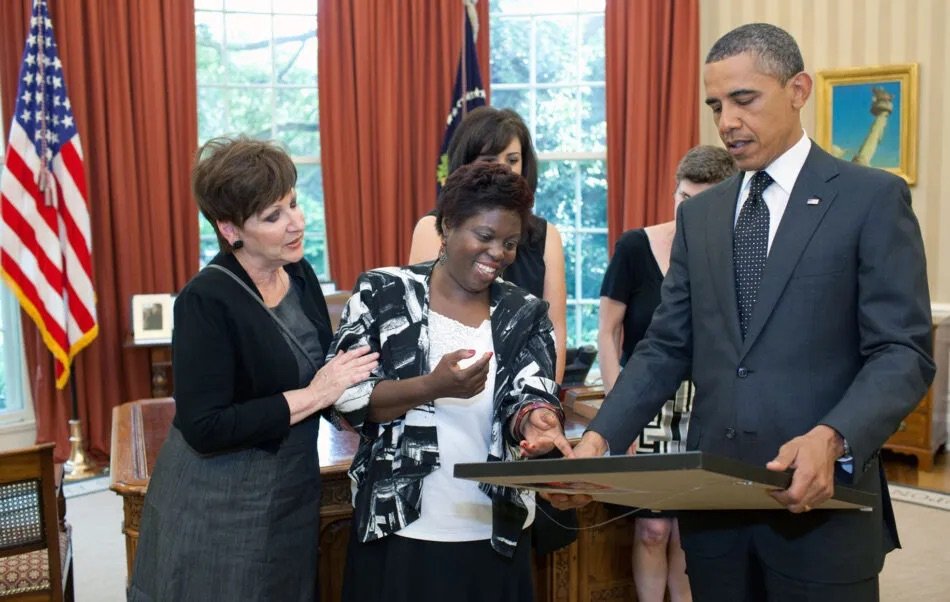Thank You, Lois Curtis, Olmstead Hero (by Jeneva Stone)
Photo Credit: Official White House photo by Pete Souza. [image description: Lois Curtis (center) presents President Barak Obama (r) with one of her paintings. To the left of Lois is her direct support professional. They are in the Oval Office.]
On June 22, 1999, when the U.S. Supreme Court issued its landmark disability rights decision in the case of Olmstead vs. L.C. & E.W., my family was at the beginning of our own disability rights journey. My son Rob had just turned two, and we were struggling with “all the things”: health insurance, durable medical equipment, impending surgery, and, most importantly, how to keep Rob in his community.
Had Rob been born 15 years earlier, he would have been automatically institutionalized. Rob and my family owe a huge debt of gratitude to Lois Curtis, the “L.C.” in the Olmstead case.
Lois Curtis, a disabled activist and artist, passed away on November 3, 2022, at the age of 55. It was Lois who was the driving force behind the Olmstead litigation. Ironically, the case is perpetually referred to by the name of the Georgia Commissioner, Tommy Olmstead, who opposed community living rights for disabled people, a reference that threatens to erase Lois Curtis from our collective memories.
Lois and Elaine Wilson (“E.W.”) were both subjected to the horrors of institutionalization. Both women were locked in state facilities due to their developmental and mental health disabilities. Lois was determined to get out. Angela Weddle, a disabled artist who has been featured on our blog, reports that Lois said of her unjust isolation and segregation, “I prayed to God. I cried at night so I prayed to God every night in my bed.”
Disabled people have been fighting for their community living rights throughout U.S. history, for the right to stay out of institutions and “asylums.” Medicaid itself did not allow in-home care until 1983 when Katie Beckett’s situation caused Congress to finally establish the first Home and Community-Based Services (HCBS) waiver. The Americans with Disabilities Act (ADA) of 1990 established community living rights, but these were difficult to enforce until Lois Curtis sued the State of Georgia for her freedom to live where she chose, and to compel the State of Georgia to provide her with appropriate HCBS supports.
Lois repeatedly contacted the Atlanta Legal Aid Society to ask for their help, and in 1995, it agreed to take her case, which took four years of effort to reach the Supreme Court. In 1999, the Supreme Court sided with Lois, a decision which put more muscle behind the ADA and the imperative to provide HCBS. The Court said that “people with disabilities like Lois and Elaine have the right to receive the treatment they need[ed] in an integrated setting if that is what they want, if their doctors agree, and if it doesn’t fundamentally change how the state provides services to people with disabilities.”
According to all accounts of her life, Lois Curtis thrived outside of the institutions that had once oppressed her. Lois Curtis was a trailblazer in many ways. Angela Weddle discusses Lois’ passion for art, and her talent for portraiture. You can see some of Lois’ art here. Sara Luterman reports on what Lois’ legacy means for disabled people of color, especially Black disabled women. Luterman also notes the intra-disability bias against those with intellectual and/or mental health disabilities, quoting activist Finn Gardiner, “There’s a divide in the disability community between people with physical disabilities and people with disabilities that affect their cognition or their mental health.” Lois Curtis secured rights for all disabled people, not just some.
In his tribute to Lois Curtis, disability activist Mike Erwin writes, “Curtis was asked what her wish was for all the people her determined action has helped move out of institutions. ‘I hope they live long lives and have their own place,’ she said. ‘I hope they make money. I hope they learn every day. I hope they meet new people, celebrate their birthdays, write letters, clean up, go to friends’ houses and drink coffee. I hope they have a good breakfast every day, call people on the phone, feel safe.’”
My son Rob, who has developmental disabilities, is now 25. When Rob transitioned from high school, he decided his life goals were to be an artist and an advocate, the path of Lois Curtis. While Rob still faces challenges to community living due to his complex medical needs, he is, nonetheless, surviving and thriving. Rob’s quality of life is a gift from Lois Curtis.
Rest in power, dear Lois.
Jeneva and Rob Stone are members of Little Lobbyists. Jeneva is the Little Lobbyists Blog Manager.

